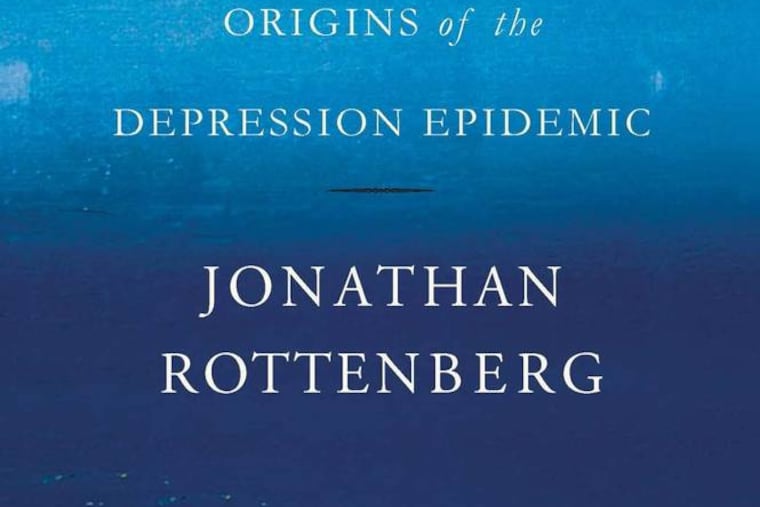'The Depths': Depression and its uses
Several years into a doctoral program in history at Johns Hopkins University, Jonathan Rottenberg called his radiologist father in a panic.

The Depths
The Evolutionary Origins of the Depression Epidemic
nolead begins By Jonathan Rottenberg
Basic Books. 272 pp. $26.
nolead ends nolead begins
Reviewed by Evi Heilbrunn
years into a doctoral program in history at Johns Hopkins University, Jonathan Rottenberg called his radiologist father in a panic.
The young historian had lost his appetite. Overwhelmed by anxiety, exhaustion, and an unexplainable pain on his left side, he could barely get out of bed. His father sought to quell his fears, saying it didn't "sound like anything too serious," Rottenberg recalled.
But the symptoms intensified. The aspiring academic would sit for hours at the library, unable to focus. Eventually, he became convinced he was dying.
In hindsight, Rottenberg suggests that a daunting dissertation and the unfavorable academic job market that lay ahead may have added to a deep depression that lasted for years. Yet terrifying as it was, it "forced me to reconsider what I was doing with my life."
Rottenberg changed course and began to delve into his own suffering. The Depths: The Evolutionary Origins of the Depression Epidemic draws upon his experience with depression, his recovery from it, and his research on mood. About 20 years since the deep depression began, Rottenberg is an associate professor of psychology at the University of South Florida, where he heads the school's Mood and Emotion Laboratory.
Mood science is at the heart of The Depths. Rottenberg argues that mood and depression must have evolved for a reason. "High moods energize behavior" while "low moods restrain behavior to ensure that an animal does not engage in fruitless efforts."
Rottenberg says low mood is the gateway to clinical depression, which is "simply a longer-lasting and deeper form of low mood."
As paralyzing as depression can be, Rottenberg emphasizes its unique benefit as a "warning sign." It becomes "a chance to take small steps in a different direction." For Rottenberg, that was applying to the doctoral program in psychology at Stanford University.
Getting a second chance at an academic career sparked Rottenberg's path to recovery. Exercise and psychotherapy helped, but a variety of medications proved futile. Other life changes such as getting married and becoming a father pushed him to see past an illness that at one point landed him in the Johns Hopkins Hospital psychiatric service.
Small but daily efforts, such as getting enough sleep and exercise, may be helpful in containing low mood. Mindfulness exercises, therapy, and medications may also provide some relief.
But the author thinks our focus must shift from finding temporary solutions to understanding depression at its root.
"We have been taught to listen to Prozac, but not to depression," he writes. He faults most conventional care, from cognitive therapy to antidepressants, for failing to focus on why depression arises in the first place.
Still, The Depths does not provide a guide to a better alternative. While Rottenberg raises good questions, he leaves us scratching for answers in a style that can be dry and hard to follow. He does stress that to conquer depression, we must understand the purpose of moods rather than suppress them.
Part of the solution requires "taking an active role, asking tough questions, and not simply waiting to be better."
Rottenberg believes our cultural obsession with happiness may be partly to blame for the rise in the ranks of the depressed, now totaling 13 million Americans. And because, he says, that number is rising dramatically, it suggests that "key forces" must be "rooted in peoples' practices and lives, rather than fully biologically grounded."
There is still no clinical way to test for depression. That may help explain why our culture associates mental illness with instability rather than a medical condition. In Rottenberg's view, we must move depression out of the shadows.
He cites projections from the World Health Organization predicting that by 2030, depression will be one of the top causes of death and disability globally, taking more lives than cancer, stroke, or natural disasters. And with tens of millions already on antidepressants, the expense will eventually force us to reevaluate our approach to care.
The Depths is a first step.